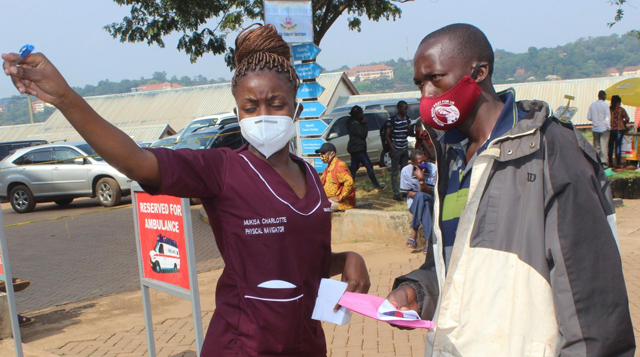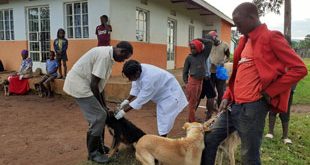
Kampala, Uganda | THE INDEPENDENT | For decades, cancer patients in Uganda have painstakingly endured barriers in accessing life-saving treatment at Uganda Cancer Institute. That may not be the case anymore as Uganda Cancer Institute integrates the patient navigation program as part of the services in cancer management in Uganda.
It is hoped that it will assists patients to complete the needed treatment and break barriers to cancer treatment and management.
The patient navigation program was launched by Professor Vinand Mukatabala Nantulya on Tuesday.
Nantulya, the current board chair of Uganda cancer institute emphasized one aspect of the program-physical navigators. The physical navigators will help the patients and their caregivers to locate where different services are located.
Professor Nantulya, the second director of Uganda Cancer Institute remembers how easy it was to go around the cancer institute which then served as lymphatic treatment center. Fifty four years later , Professor Nantulya says a lot has changed at Mulago and therefore it can be confusing to whoever is seeking treatment.
Imagine what new patients and their givers have to go through navigating around Mulago hospital Complex asked Nantulya.
“I need to be guided. I honestly don’t know what is where. I need to be guided. Although I worked here for ten years” he said
The different services offered at the Uganda Cancer Institute are scattered at different parts pf Mulago hospital.
In order to ease the physical barriers, cancer patient physical navigators in form of personnel dressed in maroon uniform have been stationed at different parts of the Institute to help patients to save time in locating the services.
The patient navigation program has existed for over thirty years in management of cancer in America and Canada.
It is aimed at helping penitents and their caregivers who face personal and systematic barriers to access to care.
A similar model has been in neighboring Kenya at Kenyatta national hospital at a smaller scale comapred to what Uganda has. Uganda becomes the second country in Africa to include the cancer patient navigation services.
In Uganda, physical barriers like patient’s lack of knowledge about the physical locations of different parts of the cancer institute has been identified as one of the barriers to access to cancer services.
The cancer patient Navigation Program Manager, Obote Amos said apart from the physical barriers, cancer patients face other barriers not connected to the services offered at Uganda Cancer Institute.
Obote said on several occasions patents have not turned up for treatment or routine examinations because they lack of transport from their home districts.
He said it is common for patients to travel with relatives and caregivers to Kampala only to face hardship with accommodation. In order to address, Obote says another component of the Patient Navigation Program is the resource navigators.
Those should help patients in need to source for resources outside cancer institute to enable patients to go through their specific challenges.
Jennifer Nabaasa is one of the resource navigators. She has seen patients undergo lots of challenges while seeking for services because most of the services at Uganda Cancer Institute are still centralized.
The biggest outcry from the patients according to Nabaasa is the cost of transport especially for those that travel from districts located far from Kampala.
So far, Nabaasa reveals that resource mobilization team is about to enter an agreement with one of the bus companies on the West Nile route to transport the patients to Kampala and back home free. It is hoped that with this, the patients will not miss appointment days.
Another crucial component of the cancer patient navigation program is the deployment of clinical navigators. This team is mainly comprised of qualified nurses donning white with a blue apron.
The clinical navigators among others specialize in counseling and interviewing and in addressing the patient’s specific barriers to care.
They not only help in navigating the systems, but also provide health education, reminders, support and accompaniment. They act as advocates and resource connectors to ensure patients get the care they need.
Nabukalu Maureen is a Senior Assistant Nursing Officer and the lead clinical navigator at Uganda. She says so far, she has come to learn that the program yields better results if the patients gain trust of the knowledge an information impart by clinicians like herself.
According to Obote Amos, the idea behind cancer patient navigator program is to eliminate barriers to cancer care in Uganda and other neighboring countries that depend on Uganda Cancer Institute for services.
The patient navigator program at Uganda Cancer Institute is being funded by America Cancer Society in collaboration with Uganda cancer Society.
It is hoped that Patient navigators can not only facilitate improved health care services but they can also address deep-rooted issues related to distrust in providers and the health system that often lead to avoidance of health problems and non-compliance with treatment recommendations.
********
URN
 The Independent Uganda: You get the Truth we Pay the Price
The Independent Uganda: You get the Truth we Pay the Price


